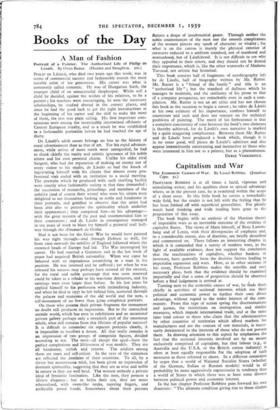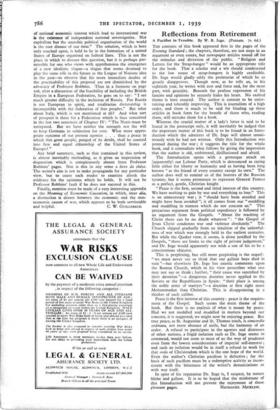Capitalism and War
PROFESSOR ROBBINS is at all times a lucid, vigorous and stimulating writer, and his qualities show to special advantage where, as in the present case, he is restricted within the scope of a short essay. In this little book he covers a remarkably wide field, but the reader is not left with the feeling that he has been fobbed off with superficial generalities. For plainly much hard thinking and wide reading have gone to the preparation of this essay.
The book begins with an analysis of the Mandan theory of imperialist wars as an inevitable outcome of the rivalries of capitalist States. The views of Marx himself, of Rosa Luxem- burg and of Lenin, with their divergencies of emphasis and, to a considerable extent, also of doctrine, are briefly described and commented on. There follows an interesting chapter in which it is contended that a survey of modern wars, in the light of available evidence, does not support the conclusion that the machinations of capitalists, whether bankers or investors, have generally been the decisive factors leading to imperialist expansion and wars. Here, as in other sections of his . essay, Professor Robbins makes the sensible and very necessary pleas, both that the evidence should be examined impartially and that a sense of proportion should be observed before a final judgement is arrived at. Turning next to the economic causes of war, he finds them chiefly in activities of sectional interests which use their political and economic power to further their own direct advantage, without regard to the wider interest of the com- munity. From this type of action spring the discriminations and quotas, the restrictions on immigration and similar measures, which impede international trade, and at the same time lend colour to those who claim that the administration by other countries of territories which afford markets for manufactures and are the sources of raw materials, is neces- sarily detrimental to the interests of those who do not possess them. In drawing attention to this aspect he emphasises the fact that the sectional interests involved are by no means exclusively comprised of capitalists, but that labour (e.g., in Australia and the U.S.A. or the British cotton industry) is often at least equally responsible for the adoption of such measures as those referred to above. In a different connexion he urges that a world of National Socialist States (whether of the German, Italian or Russian models) would in all probability be more aggressively expansionist in tendency than a world of States in which there was at least some divorce between political power and economic interest.
In the last chapter Professor Robbins puts forward his own diagnosis : " The ultimate condition giving rise to those clashes
of national economic interest which lead to international war Is the adstence of independent national sovereignties. Not capitalism but the anarchic political organisation of the world is the root disease of our time." The solution, which is here only touched upon, is held to lie in the formation of a united States of Europe organised on federal lines. This is not the place in which to discuss this question, but it is perhaps per- missible for one who views with apprehension the emergence of a new idealistic slogan—a slogan that seems destined to play the same role in the future as the League of Nations idea in the past—to observe that his more immediate doubts of the practicability of this proposal are not diminished by the advocacy of Professor Robbins. Thus in a footnote on page to6, after a discussion of the feasibility of including the British Empire in a European Federation, he goes on to say : " I see much greater difficulty in the inclusion of Russia. For Russia is not European in spirit, and totalitarian dictatorship is incompatible with the federation of free peoples." But what about Italy, which is not mentioned at all? And what sort of prospect is there for a Federation which is thus conceived in the last two sentences of Chapter IV : " The Nazis must be extirpated. But we have neither the strength nor the will to keep Germans in subjection for ever. What more appro- priate outcome of our present agonies . . . than a peace in which this great people, purged of its devils, shall be coerced into free and equal citizenship of the United States of Europe? "
Any brief summary, such as that contained in this review, is almost inevitably misleading, as it gives an impression of dogmatism which is conspicuously absent from Professor Robbins' pages. Nor is this in any sense a lime de these. The writer's aim is not to make propaganda for any particular view, but to cause each reader to examine afresh the evidence for the opinions which he holds. It will not be Professor Robbins' fault if he does not succeed in this.
Finally, mention must be made of a very interesting appendix on the Meaning of Economic Causation, in which, inter alia, a distinction is drawn between the economic and the non- economic causes of war, which appears to be both serviceable













































 Previous page
Previous page